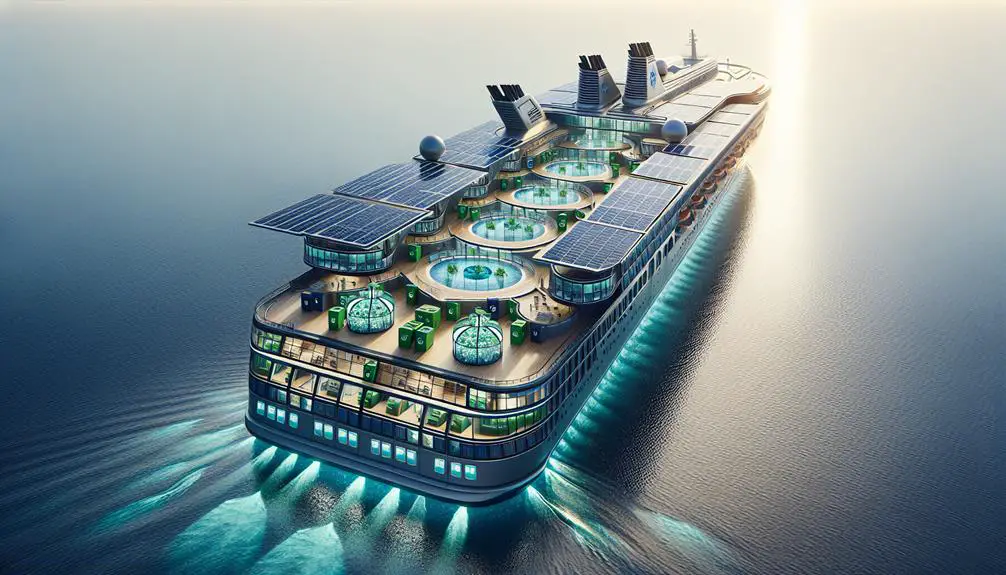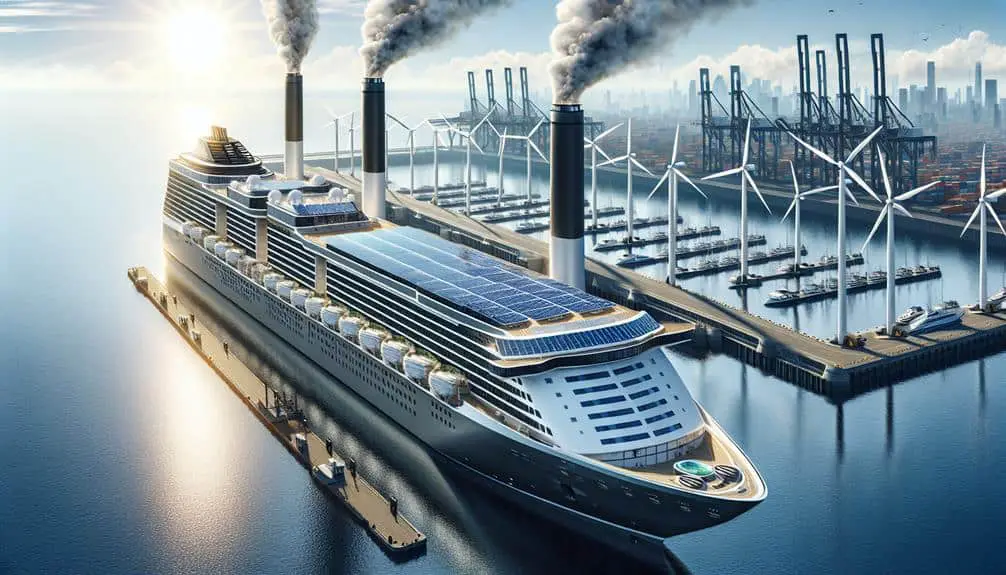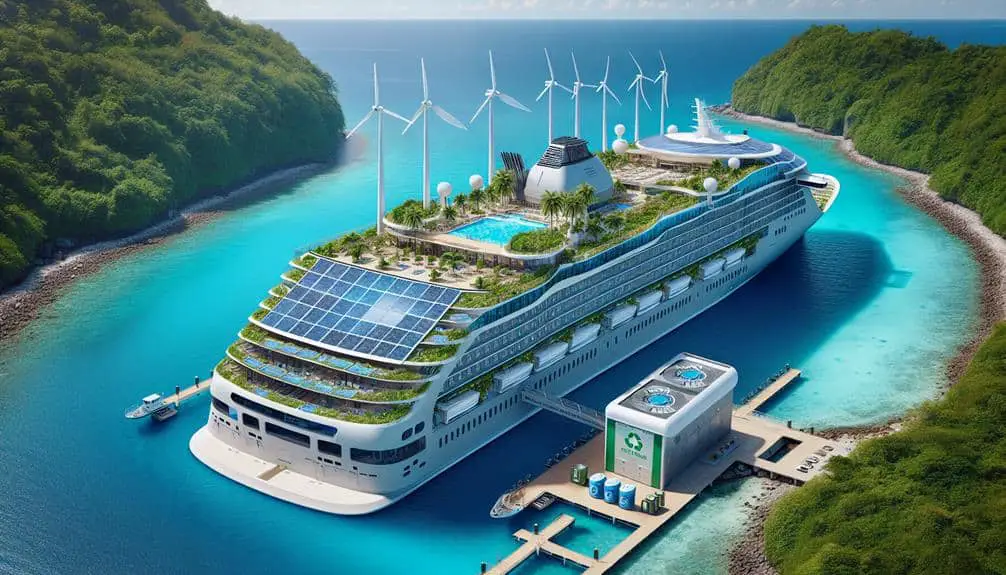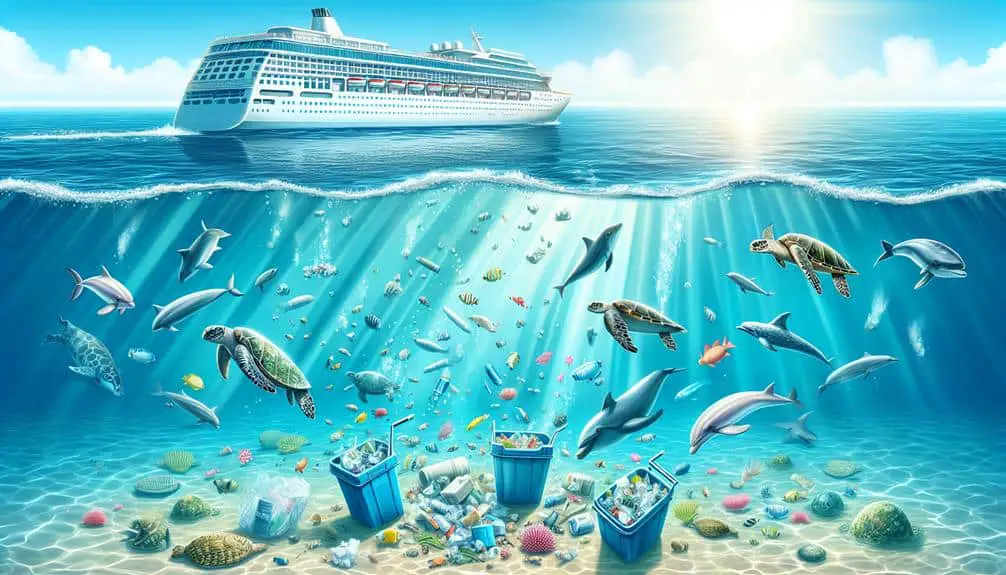On modern cruise ships, eco-friendly amenities are crucial. Using reusable and biodegradable options cuts down on plastic waste. Embracing energy-efficient LED lighting saves energy and reduces the carbon footprint. Implementing sustainable food practices like farm-to-table dining supports local farmers and reduces transportation emissions. Water conservation measures like rainwater harvesting and low flow showers help in the efficient use of water. Waste management strategies such as recycling and composting minimize waste and promote responsible disposal. These eco-friendly initiatives not only lessen environmental impact but also enhance your cruise experience. Discover how these amenities make a significant difference onboard.
Key Points
- Reduce environmental impact and carbon footprint
- Meet growing demand for sustainable travel options
- Enhance guest experience with eco-friendly practices
- Contribute to global conservation efforts
- Stay competitive in the industry by adopting eco-conscious measures
Reduced Plastic Usage
To enhance sustainability efforts onboard modern cruise ships, reducing plastic usage is a key initiative that greatly minimizes environmental impact. By implementing reusable alternatives and biodegradable options, cruise lines can greatly decrease the amount of single-use plastics used onboard. Switching from disposable plastic straws to biodegradable or reusable alternatives not only reduces plastic waste but also prevents harm to marine life.
Providing guests with refillable water bottles instead of single-use plastic bottles is another effective way to cut down on plastic usage. Additionally, offering biodegradable utensils and containers in dining areas helps to reduce plastic waste generated during meals.
Cruise companies are increasingly recognizing the importance of reducing plastic usage to protect the oceans and marine ecosystems. By incorporating reusable alternatives and biodegradable options into their operations, cruise ships can set a positive example for sustainable practices in the travel industry. Making these changes not only benefits the environment but also enhances the overall guest experience by promoting a cleaner and greener cruising environment.
Energy-Efficient Lighting
Implementing energy-efficient lighting systems onboard modern cruise ships is important for reducing energy consumption and enhancing sustainability efforts while providing a well-lit environment for guests and crew members. Energy-efficient LED lights, for instance, consume markedly less power than traditional incandescent bulbs, resulting in substantial cost-saving measures for cruise ship operators. These lighting systems not only lower electricity bills but also have a positive environmental impact by reducing the ship's overall carbon footprint.
By incorporating motion sensors and automatic dimming features, cruise ships can further optimize their lighting efficiency. Motion sensors guarantee that lights are only active in occupied areas, preventing unnecessary energy wastage. Automatic dimming adjusts lighting levels based on natural light availability, maintaining a comfortable ambiance while conserving energy.
Energy-efficient lighting not only contributes to a greener environment but also enhances the overall guest experience by providing well-lit spaces throughout the ship. With cost-saving benefits and reduced environmental impact, investing in energy-efficient lighting is an important step towards achieving sustainability goals in the cruise industry.
Sustainable Food Practices
Enhancing sustainability efforts onboard modern cruise ships extends beyond energy-efficient lighting to encompass sustainable food practices that play a significant role in reducing environmental impact and promoting responsible consumption.
One way cruise ships are implementing sustainable food practices is through farm-to-table dining. By sourcing ingredients locally and supporting regional farmers, cruise lines reduce the carbon footprint associated with food transportation. This practice also guarantees fresher, higher quality meals for guests, enhancing the overall dining experience.
Composting initiatives are another key aspect of sustainable food practices on modern cruise ships. Food waste is collected and composted to create nutrient-rich soil for onboard gardens or to be donated to local farms at port stops. This not only minimizes the amount of waste sent to landfills but also contributes to a circular economy approach where resources are reused efficiently.
Water Conservation Measures
Water conservation onboard modern cruise ships involves innovative technologies and strategic practices to minimize waste and promote sustainability. To achieve this, consider implementing the following measures:
- Rainwater Harvesting: Utilizing rainwater for non-potable purposes like laundry and deck washing can greatly reduce freshwater consumption onboard.
- Low Flow Showers: Installing low flow showerheads helps limit water usage during showers without compromising guest experience, ensuring efficient water use throughout the ship.
- Greywater Recycling Systems: Implementing systems that treat and reuse greywater from sinks and showers for tasks like flushing toilets can further decrease water waste.
- Real-Time Monitoring: Utilize advanced monitoring systems to track water usage in different areas of the ship, allowing for targeted adjustments and continuous improvement in conservation efforts.
Waste Management Strategies
To effectively manage waste onboard modern cruise ships, a holistic system integrating recycling, composting, and incineration practices is essential for promoting environmental stewardship and sustainability.
Implementing a thorough recycling program involves segregating waste into categories like paper, plastic, glass, and metal for proper disposal or recycling at ports. Cruise ships can also reduce waste by partnering with suppliers to minimize packaging and single-use items.
Additionally, establishing a composting program onboard allows organic waste like food scraps and biodegradable materials to be converted into nutrient-rich soil for gardening or disposal at sea following strict environmental regulations.
Incineration practices, when done responsibly and in compliance with international regulations, can help manage non-recyclable waste efficiently. By investing in advanced incineration technologies that minimize emissions and maximize energy recovery, cruise ships can reduce the volume of waste sent to landfills.
Frequently Asked Questions
How Do Eco-Friendly Amenities on Modern Cruise Ships Contribute to the Overall Sustainability of the Maritime Industry?
Incorporating eco-friendly amenities on modern cruise ships contributes to the maritime industry's sustainability through sustainable practices. These amenities reduce environmental impact by conserving resources, minimizing waste, and promoting responsible tourism, ensuring a healthier planet for future generations.
Are There Any Specific Regulations or Guidelines in Place to Ensure That Cruise Ships Are Implementing Eco-Friendly Amenities Effectively?
Ensuring regulatory compliance on cruise ships is crucial. Sustainable practices are essential. From waste management protocols to energy-efficient systems, guidelines enforce eco-friendly amenities. The industry aims for a greener future, benefitting all.
How Do Cruise Ship Companies Educate and Involve Passengers in Supporting Eco-Friendly Initiatives While on Board?
Passenger engagement is vital for onboard sustainability. Cruise companies educate through interactive experiences, fostering environmental education. Initiatives like waste reduction programs and wildlife conservation tours involve you in supporting eco-friendly practices, making a positive impact while cruising.
What Technologies or Innovations Are Being Developed to Further Improve the Eco-Friendliness of Cruise Ships in the Future?
In the future, cruise ships are embracing sustainable practices through innovative green technology to reduce their environmental impact. These advancements include eco-friendly propulsion systems, waste management solutions, and energy-efficient designs to promote a greener industry.
Are There Any Challenges or Obstacles That Cruise Ship Companies Face in Implementing and Maintaining Eco-Friendly Amenities on Their Vessels?
Traversing the sea of challenges in eco-friendly amenities on cruise ships can be tricky. However, with innovative solutions like advanced waste management systems and energy-efficient technologies, companies can steer towards a greener future.




